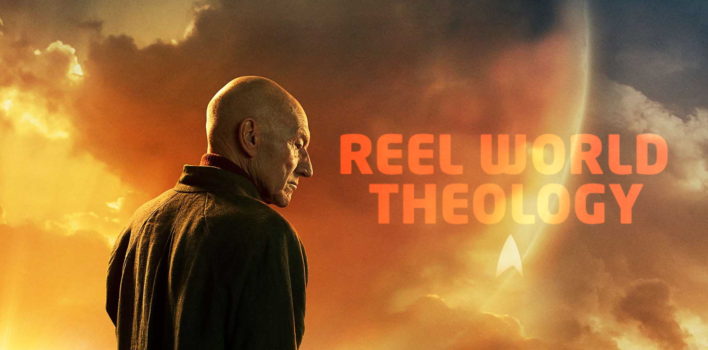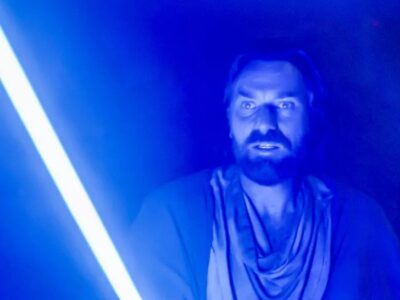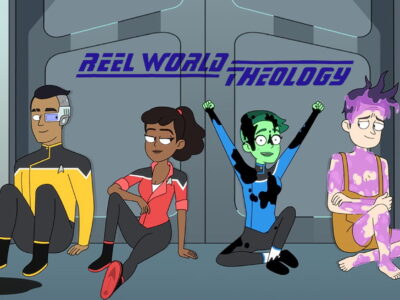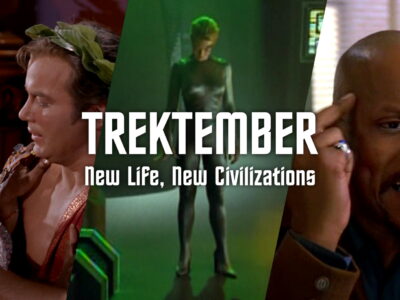“Broken Pieces” – Star Trek: Picard S1E08
There’s a delightful (if not disconcerting) moment near the middle of “Broken Pieces,” where Agnes Jurati asks Jean-Luc Picard if he believes in hell. Picard’s breathy sigh and casually lifted eyebrow are a wonderful piece of subtle acting from Patrick Stewart. It’s telling of the character’s beliefs, as well as those of the writing team. It makes hell seem like a ridiculous notion, even though the episode spends a lot of time trying to conjure up what they think a hell might look like: apocalyptic visions, Romulans losing their minds, and death all around.
 The episode also finally provides us some back story about why the events of the season are happening. The Conclave of Eight, we discover, is an ancient place of warning. The Zhat Vash are essentially tasked with defending the universe from the return of an apocalyptic hell. Since it once existed, one can only conclude that it was ended at some point, no? And if our story is about valuing the life of the individual (be they Romulan, human or synthetic) it would seem that acceptance, not violence, is the weapon to defeat the apocalypse.
The episode also finally provides us some back story about why the events of the season are happening. The Conclave of Eight, we discover, is an ancient place of warning. The Zhat Vash are essentially tasked with defending the universe from the return of an apocalyptic hell. Since it once existed, one can only conclude that it was ended at some point, no? And if our story is about valuing the life of the individual (be they Romulan, human or synthetic) it would seem that acceptance, not violence, is the weapon to defeat the apocalypse.
Jurati: Unless we act quickly and destroy even the possibility of synthetic life…
Picard: Hell will come again?
We don’t yet know why synthetic life could bring about the apocalypse, but we sure do know that a lot of people think killing them all will prevent it. Have the Zhat Vash never questioned the alternative? What if trying to destroy synthetic life is the very thing that causes the coming of the destroyer? Paradoxes, man, they’ll get ya. Perhaps the Zhat Vash should read the Bible. After all, the original destruction of God’s created intention by man’s fall is what brought us our broken world, and then hell became a real thing.
Scripture shows us that hell is a very real place, much like those crazy visions of the Zhat Vash. It’s described as a place of torment and anguish, desperation and wailing. Yet the single most frightening reality of hell isn’t the gnashing of teeth or a lake of fire—it’s the eternal judgement of our Creator. The one who created us for community with Him sits in judgement on those who reject him. Absolutely horrifying thought if you ask me.
And yet there are those that would continue to destroy God’s created intent. The Zhat Vash operate with violence and deception to essentially play god to prevent hell; yet hell is inevitable without Christ. I love that Agnes sees the error of this here. One look at Soji and she’s back to understanding the miracle of God’s creation (whether she realizes that’s what she’s doing or not).
Jurati (to Soji): You are a wonder. A technological masterpiece. A work of art.
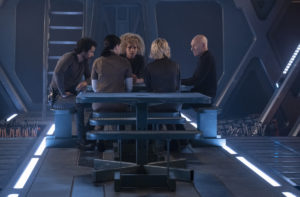
Rios is another who sees the value of this unique life. He actually provides a timely illustration for all of us sitting in isolation during the COVID19 crisis: but he’s secluded himself for all the wrong reasons. We might be social distancing for the health of others, but Rios is social distancing because of his pain. He may look like a badass, but we discover here that he’s really an old softy, caring deeply for his former captain, his crew, as well as Soji’s long lost sister whom he only met briefly (which actually does make him a badass, no?).
Raffi’s reaching out to Rios despite his protestations not only brings him out of his pain, it also helps the crew better understand the truth of the situation. It moves Rios back into God’s created intent—community with others—and that’s what we’ve seen throughout the season as the real key to preventing the hell the Zhat Vash are so afraid of. Seeing the artistry of the individual is to see through the eyes of our Creator. It’s how we show the heart of God to others, and that is how He reveals himself to us.
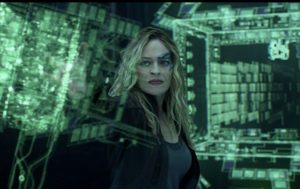 The Borg provide a further parallel to this. Seven of Nine’s incredibly cool, yet totally frightening control over the Borg in this episode shows a literal hive mind fighting against a religious cult hive mind in the Zhat Vash. What allowed Seven to use this control for good, and to ultimately disconnect from the hive, is her value of the individual. She turned the torment of the Borg into a work for good because she valued their lives. Now that’ll preach.
The Borg provide a further parallel to this. Seven of Nine’s incredibly cool, yet totally frightening control over the Borg in this episode shows a literal hive mind fighting against a religious cult hive mind in the Zhat Vash. What allowed Seven to use this control for good, and to ultimately disconnect from the hive, is her value of the individual. She turned the torment of the Borg into a work for good because she valued their lives. Now that’ll preach.
As the first season of Picard winds down, I’m glad that this will be the lasting impression of our story. That we’ll see that loving people brings about healing, and violence against them never thrives. Whether the writing team believes any of this spiritual stuff they’re covering or not, their show illustrates the work of the gospel. I’ll be sad when the credits roll on the season finale, and not because we need good things to watch while we’re holed up in our homes from COVID19. We just need as many good pictures of the gospel like this that we can get.


